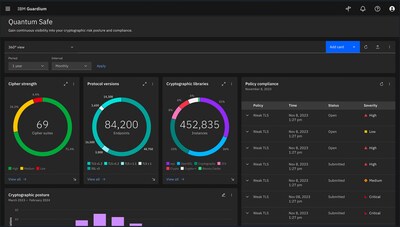
IBM has rolled out a new platform to help enterprise customers better handle the complicated data workflows and security risks that arise when managing AI deployments, hybrid cloud infrastructure, and quantum computing systems.
IBM Guardium Data Security Center is a SaaS-based offering that integrates a number of new IBM security packages. Customers can access a single dashboard view of their data assets, which allows security teams to take an integrated approach to data monitoring and governance, data detection and response, data and AI security posture management, and cryptography management.
“Generative AI and quantum computing provide immense opportunities, but they also bring new risks,” said Akiba Saeedi, vice president, IBM security product management, in a statement. “During this transformative time, organizations need to improve their crypto-agility and carefully monitor their AI models, training data, and usage.”
IBM Guardium AI Security
The platform features Guardium AI Security, which is software designed to manage security risks and data governance requirements for AI data and AI models. The module discovers AI deployments, oversees compliance, mitigates vulnerabilities, and protects sensitive data in AI models, IBM stated.
“IBM Guardium AI Security integrates with IBM watsonx and other generative AI SaaS providers. For example, IBM Guardium AI Security helps discover ‘shadow AI’ models and then shares them with IBM watsonx.governance, so they no longer elude governance,” IBM stated.
The Guardium AI Security module also helps secure AI systems by alerting customers when sensitive business data used for training AI is publicly exposed, unprotected, or vulnerable to theft, IBM stated. It monitors who in an organization can access, modify, or configure AI models during training or in production. And, it can detect prompt injections or jailbreak attempts on AI chatbots deployed by the enterprise, IBM stated.
IBM Guardium Quantum Safe
Another key module is Guardium Quantum Safe, which is designed to help customers protect their sensitive data and harden their environments against quantum-enabled cyber risks.
“The Guardium Quantum Safe module provides users with ongoing comprehensive visibility into, and greater control over, the cryptography used across their IT environment so they can prioritize vulnerabilities and create a targeted remediation roadmap,” IBM stated.
The module helps organizations manage their cryptographic security systems by applying security policies against their cryptographic inventory, discovering cryptographic vulnerabilities, and prioritizing remediation according to business objectives.
Guardium Quantum Safe integrates with common network operations and scanning tools, and it explores which cryptographic assets are used by which applications and network endpoints in order to secure sensitive or privileged data, IBM stated.
IBM
Customers can opt to integrate other modules into the broader IBM Guardium Data Security Center platform as well. For example, IBM Security Guardium Data Protection lets customers protect sensitive data across cloud and on-premises environments, and IBM Security Guardium Vulnerability Assessment lets users scan for database vulnerabilities on-premises or in the cloud.
IBM Guardium Data Security Center is expected to be available in November.
Distributed environments amp up security requirements
Recent research from IBM and Cisco points to the need to help enterprise customers better control security across multiple systems.
The global average cost of a network data breach has climbed to a record $4.88 million – which represents a 10% increase from 2023 and the largest spike since the pandemic, according to IBM’s 2024 Cost of a Data Breach Report.
“These multi-environment breaches cost more than $5 million on average and took the longest to identify and contain (283 days), highlighting the challenge of tracking and safeguarding data, including shadow data, and data in AI workloads, which can be unencrypted,” wrote IBM Security team member John Zorabedian in a blog discussing the research results.
Meanwhile, a recent Cisco study found that 92% of organizations have deployed two or more public cloud providers to host their workloads, and 34% are using more than four.
“However, each public cloud service provider, private data center, and hybrid cloud environment uses different network and security operational models. Organizations need to address the resulting management complexity with a strategy that enables better visibility and more consistent control of connectivity and security across disparate private and public cloud environments,” Cisco stated.
Source:: Network World
